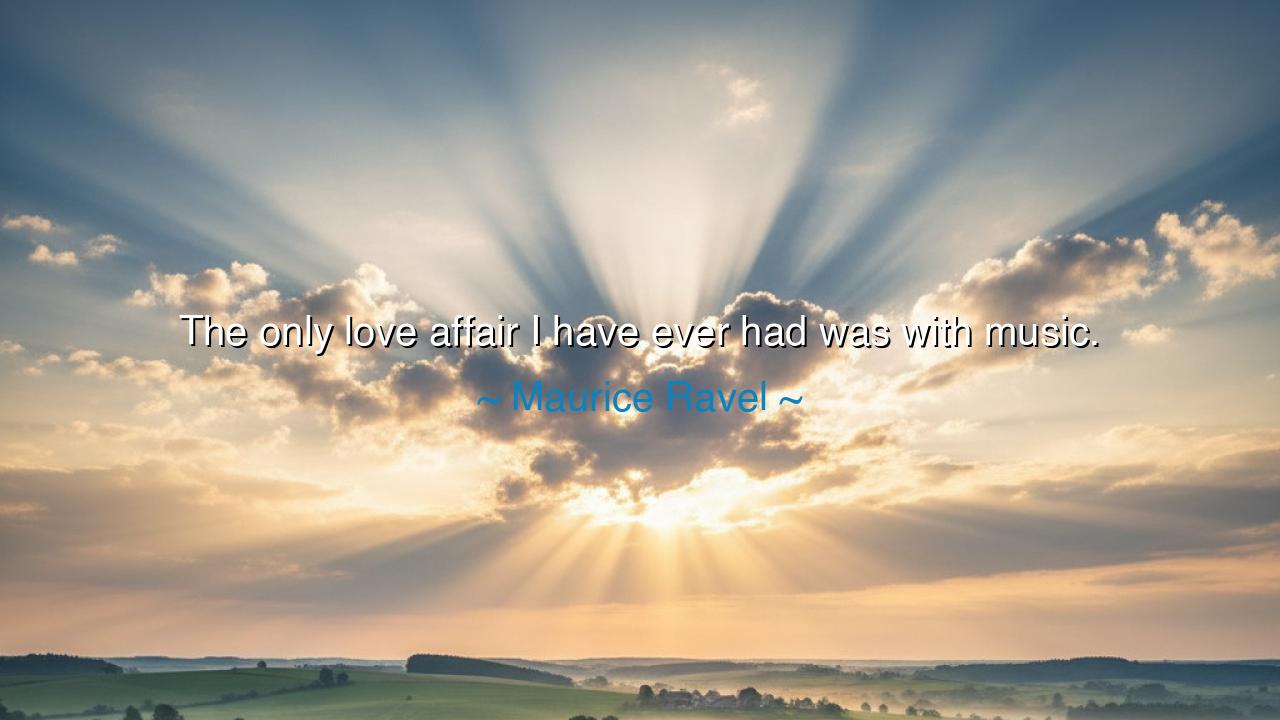
The only love affair I have ever had was with music.






In the quiet brilliance of his life, the composer Maurice Ravel once declared: “The only love affair I have ever had was with music.” These words, elegant and eternal, are the confession of a soul devoted not to flesh and passion, but to art — the one companion that never betrayed him. To Ravel, music was not mere sound, but the voice of eternity; it was his muse, his solace, his one true love. In that declaration, he revealed a truth that transcends time: that devotion to one’s calling can be as consuming, as tender, and as sacred as any romance between human hearts.
Ravel, born in the age of impressionism, lived in a world rich with color, movement, and feeling. Yet while others chased companionship and worldly fame, he chose the path of the artist — solitary, disciplined, and luminous. He poured into his work what others gave to lovers: attention, desire, patience, and wonder. His love was expressed through creation — through melody and precision, through the perfection of sound. When he wrote Boléro or Daphnis et Chloé, he was not merely composing; he was communing. Each note was a heartbeat; each silence, a sigh of longing. And so his music, like the language of the heart, still speaks across centuries to those who listen with feeling.
To call one’s art a love affair is to understand love in its deepest form — not as possession, but as devotion. Ravel’s words remind us that true passion does not always wear the face of another person. Sometimes it takes the form of a craft, a purpose that demands our whole being. The artist, like the lover, must surrender — body, mind, and spirit. There is joy in that surrender, but also sacrifice: the loneliness of perfection, the pain of never being fully understood. Yet for those who follow their calling with purity of heart, that sacrifice becomes a kind of holiness. It is the price paid for communion with beauty itself.
Consider the life of Ludwig van Beethoven, who, though tormented by deafness and isolation, remained bound to his art with a love fiercer than any earthly attachment. He, too, might have echoed Ravel’s words, for he wrote to his “immortal beloved” not of a person, but of the divine force that spoke through him — music. When all else left him, when even hearing itself was stolen away, he still composed. His love endured beyond the body, beyond the senses. It was proof that the deepest love does not always seek pleasure, but meaning — that love can exist not only between two souls, but between a soul and its purpose.
Ravel’s statement also carries a whisper of melancholy. To love only one thing so completely is both glorious and tragic. For he lived without marriage, without great romance — his tenderness poured instead into symphonies, his longing carved into sound. Yet perhaps that is what made his art immortal. For human love fades with time, but love poured into creation endures. His music, born from this solitary affection, continues to move hearts long after his body has turned to dust. Thus, he achieved the rarest kind of immortality — not through descendants of blood, but through descendants of sound.
There is a lesson here for all who seek to live meaningfully. Whatever your passion — be it music, craft, teaching, or service — love it completely. Give it your fidelity, your patience, your joy. Let it become your teacher, your mirror, your home. For love that is pure devotion, whether for a person or a purpose, refines the soul. It draws you closer to truth. As Ravel’s life teaches, when you give your heart wholly to your art, the world, in return, receives the fragrance of your spirit — and that gift endures beyond time.
So, dear listener, remember this wisdom: not all love stories are written between two hearts. Some are written between a soul and its creation. Maurice Ravel’s words are a hymn to that eternal bond — the union of heart and craft, of mortal and divine. If you find that one thing that makes your spirit come alive, cherish it. Nurture it as he did his music. For to love one’s purpose completely is to live a life of meaning — and to leave behind a melody that the world will never forget.






AAdministratorAdministrator
Welcome, honored guests. Please leave a comment, we will respond soon